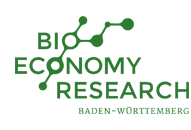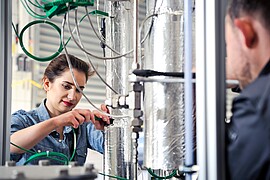Lignocellulose biorefinery for the Bioeconomy in Baden-Württemberg (B4B)
In the B4B project, an exemplary lignocellulose biorefinery was built, operated and evaluated on a representative bench scale. Miscanthus is split into carbohydrates and a lignin fraction by acidic digestion. At the “Unterer Lindenhof” station of the University of Hohenheim, processes for the extraction of furfural and 5-hydroxymethylfurfural from miscanthus were implemented on a kilogram scale; the remaining lignin was further split into phenol-based products at the Karlsruhe Institute of Technology (KIT). Particular attention was paid to the development of separation processes through distillation, extraction and adsorption, which were tested in the laboratory and then tried out on a larger scale. The product samples obtained in this way were categorized and evaluated according to their possible use for specific applications. On the basis of the mass and energy balances, supported by process simulations, the investment and production costs for two possible B4B biorefinery concepts were estimated at KIT. The "on farm" concept is combined with the operation with a biogas plant. A ten times larger "regional" plant concept is based on a merger of several agricultural farms. Without optimization and consideration of additional by-products, the B4B system concept shows a positive return under certain assumptions and thus represents an economic approach to convert regional biomass into bio-based platform chemicals and thus substitute petroleum-based raw materials. The decentralized character of the plant concept also promotes rural areas and can make a contribution to the implementation of biorefineries for the bioeconomy in Baden-Württemberg. In order to evaluate the market opportunities, BIOPRO GmbH Baden-Württemberg analyzed various product use options, market potentials of the products under consideration and possible stakeholders from industry and trade relevant for the entire production and supply chain. Interested actors and stakeholders were integrated into a network for the further biorefinery development, for which specific candidate regions for the erection of a demonstration plant were identified.
| Project title | Lignocellulose biorefinery for the bioeconomy in Baden-Württemberg (B4B) |
| Institutions and researchers | Karlsruhe Institute of Technology (KIT), Institute of Catalysis Research and Technology (IKFT) University of Hohenheim, Fg. Conversion Technologies of Biobased Resources BIOPRO Baden-Württemberg GmbH |

